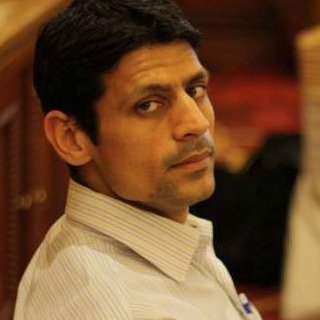Every Byte Counts
 Earlier I worked as a field engineer in Schlumberger, providing Drilling Services. Drilling is a very high tech, and arduous task; whether it’s on land, on a river, on deep waters. My job on any rig was to determine the direction of the oil well and properties of the rocks we burst through – its density, its resistivity, its shear strength, its porosity. We did this via real time telemetry of data from sensors placed on the rig as well as from sensors that were sent many kilometres down into the earth. All this data came to our computers in bytes of 1s and 0s. We had to be rigorous in analyzing every bit of this data as any misinterpretation could mean the difference between finding oil or water.
Earlier I worked as a field engineer in Schlumberger, providing Drilling Services. Drilling is a very high tech, and arduous task; whether it’s on land, on a river, on deep waters. My job on any rig was to determine the direction of the oil well and properties of the rocks we burst through – its density, its resistivity, its shear strength, its porosity. We did this via real time telemetry of data from sensors placed on the rig as well as from sensors that were sent many kilometres down into the earth. All this data came to our computers in bytes of 1s and 0s. We had to be rigorous in analyzing every bit of this data as any misinterpretation could mean the difference between finding oil or water.
The Atypical Product Manager
After working for Schlumberger for 8 years, I did my MBA from ISB-Hyderabad. There I met Hitesh, then the COO, and he hired me to Infoedge. Having a background in oil drilling and sales, my knowledge of the internet was limited. I wasn’t hired for any specific, well defined role. When I joined, I did a bunch of assignments related to Online Marketing, TeleSales, Competition Assessment etc. After a few weeks of such ‘consulting type’ assignments, I was asked if I would like to head the Product Management team of Naukri.com.
My understanding of what a Product Manager does was next to nil. I assumed programming was an essential part of this role. However, Hitesh and Vibhore allayed my concerns, explaining what my role would be. I was told, by way of an example in a lighter vein, “If you leave Naukri.com to the Techies, it would look like tables of data, with very little aesthetics to it. If you leave it to the Marketing team, all you would see is banners all over the site”. Although this was clearly exaggerated, they went onto to explain that this means that the Product Management team acts as a pivot, to the Sales, Marketing, Technology and other teams, keeping the many teams’ expectations in consideration while evolving the Product in a way that benefits the users. This sounded interesting and it seemed right down my alley, so I was excited to take this challenge up.
Key Victories
The reason I brought up my experience as an Oilfield engineer is because it built a rigour to pay attention to details of planning and nuances of execution. Whether it is drilling for oil or whether it’s for improving an internet product, making logical, data based decisions and teamwork are key to success. Moreover, in both the jobs when you make a pitch to various stakeholders, the recommendations have to be crisp, strong and factually correct. So, interestingly, I was able to bring learnings (a lot more than one would imagine) from my previous job and apply them to challenges here.
- Communication: The goal for any business is to increase the returning visitors. In our case the only way to achieve this was having relevant jobs for candidates and communicating them to our users in a manner that was effective and didn’t look like spam. Hence, we worked on every email communication to be crisp with a clear call to action. The subject lines, signatures, salutations, the contrast in colours, the font type and font size had to be well thought through. The team also brought about a complete re-vamp to many aspects of the site communication and interfaces, and we have sometimes seen a massive jump in our metrics just because of this.
- Transparency in information and no silo’s: Every stake-holder must be privy to the same information, and every one must be spoken to in the same voice with the same data. This has been one of the critical things that the Naukri product team ensures, especially in terms of decision making and dissemination of site metrics.
- Improving algorithms: Naukri has over 15 algorithms running on different applications, and sometimes you see 3-4 flavours of the same algorithm depending on which page you are querying from. The challenge of matching a CV to a job is that a CV, which consists of thousands of words needs to be matched with a Job Description, which also consists of thousands of words – and our algorithms have to determine which are the most important of those words that need to be matched, and which words are to be ignored. The search and match algorithms have in recent times changed significantly from the earlier versions of them. We have had fantastic results and this has been thrilling for our team.
- Growing the team: The up-curves in advancement in Naukri have been good because of the superior PM’s we have on board. It has reached a stage where the product team has become greater than the sum of its parts. One person cannot know everything about a product especially with a complex product like Naukri. So the only way to achieve effective results is to have a very strong group of 7-8 people amongst whom collectively every piece of knowledge is available, and that they work as a transparent team within and with other teams.
The Power Of The Marginal
I’ll just sum up with something Paul Graham talks about in his essay ‘The Power of the Marginal’. He states that “… outsiders, free from convention and expectations, often generate the most revolutionary of ideas”.” In my personal case I was an outsider to the internet business and that helped me contribute new ideas and ways. In hindsight, my exposure to sketching, photography, reading, writing and an interest in Psychology helped me appreciate the work that goes into the Design and Marketing of our product, and allowed me to contribute to it. This automatically involves you with the other teams at a whole new level and leaves a lot of room for collaboration. Who knew hobbies and interests developed decades ago would help me shape my job? Hence, I feel a PM with a diverse background, someone who is as good with Divergent Thinking as with Convergent Thinking, someone who is as comfortable with artistic subjectivity as he or she is with logical objectivity, could be more effective than a PM with an only technology background.
#PNHANGOUT is an ongoing series where we talk to Product Managers from various companies to understand what drives them, the products they work on and the role they play in defining the products success.
If you have any feedback or questions that you would like answered in this series feel free to tweet to me: @akashj


